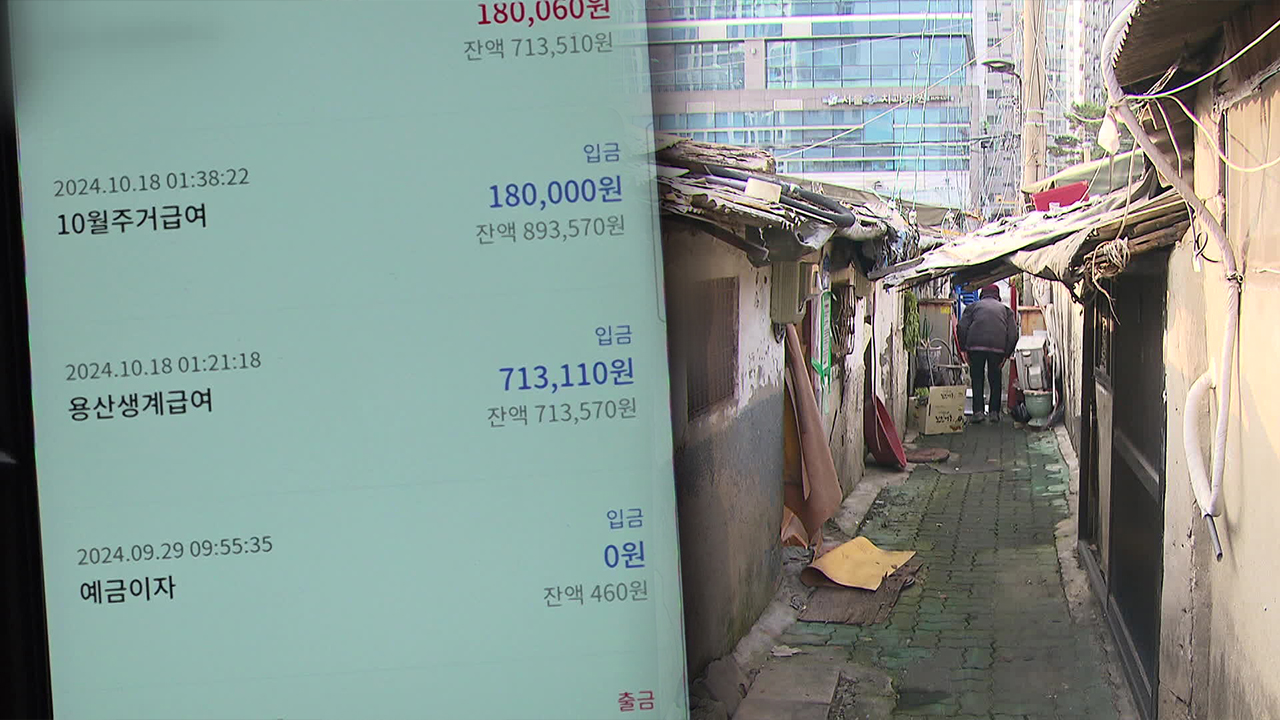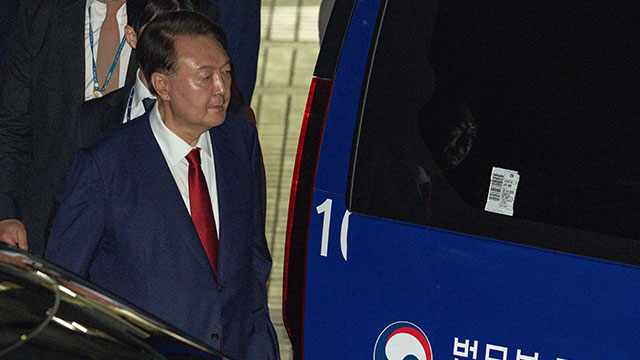Emergency welfare program suspended in four districts in Seoul
입력 2024.12.17 (01:54)
읽어주기 기능은 크롬기반의
브라우저에서만 사용하실 수 있습니다.
[Anchor]
You may remember the 'Songpa Incident' where three women died due to financial difficulties in a welfare blind spot ten years ago.
Since then, emergency welfare programs have been strengthened, but recently, the number of districts that have suspended these programs due to budget shortages is increasing.
Next year, the budget is expected to decrease even further.
What is the background behind this? Reporter Joo Hyun-ji has investigated.
[Report]
This man in his 50s, who faced homelessness due to health issues and job loss, has recently settled in a cramped one-room village.
Thanks to the emergency welfare program.
[Mr. A/one-room village resident: "I receive about 890,000 won a month, and my rent is about 180,000 won. If I hadn't received emergency support, I probably would have been wandering around Seoul Station homeless."]
Under the 'Emergency Welfare Program', low-income individuals who are struggling to maintain their livelihoods due to job loss or illness receive support for food and housing costs.
The principle is 'pre-support and post-investigation' to ensure quick assistance.
The problem is that the number of autonomous districts in Seoul that have suspended this program is steadily increasing.
In fact, as of last month, four autonomous districts, including Gangnam, Mapo, Dongjak, and Gangbuk, have suspended the emergency welfare program due to budget shortages.
[Public official in charge of welfare in ○○ district/voice altered: "The central government is providing less funding because the Ministry of Health and Welfare has no budget, and the city budget is also insufficient, so we have been unable to execute it since the end of October."]
Next year poses an even bigger problem than this year.
The budget for the emergency welfare program next year is 350.1 billion won, which is a 2.3% decrease from this year.
The Ministry of Welfare explained that due to a shortage in the main budget, they have reallocated funds and prepared a supplementary budget, and they have reduced the program's budget because there was a surplus of 20 billion won annually.
However, related civic groups point out that this is unrealistic.
[Jung Seong-cheol/Secretary General of the Poverty Society Solidarity: "Despite the fact that the program repeatedly requres supplementary budgets every year, the total budget is too low, so we have no choice but to suspend the program."]
As the emergency welfare program was established for 'crisis response', there is a growing call to increase the main budget to strengthen the welfare safety net.
This is KBS News, Joo Hyun-ji.
You may remember the 'Songpa Incident' where three women died due to financial difficulties in a welfare blind spot ten years ago.
Since then, emergency welfare programs have been strengthened, but recently, the number of districts that have suspended these programs due to budget shortages is increasing.
Next year, the budget is expected to decrease even further.
What is the background behind this? Reporter Joo Hyun-ji has investigated.
[Report]
This man in his 50s, who faced homelessness due to health issues and job loss, has recently settled in a cramped one-room village.
Thanks to the emergency welfare program.
[Mr. A/one-room village resident: "I receive about 890,000 won a month, and my rent is about 180,000 won. If I hadn't received emergency support, I probably would have been wandering around Seoul Station homeless."]
Under the 'Emergency Welfare Program', low-income individuals who are struggling to maintain their livelihoods due to job loss or illness receive support for food and housing costs.
The principle is 'pre-support and post-investigation' to ensure quick assistance.
The problem is that the number of autonomous districts in Seoul that have suspended this program is steadily increasing.
In fact, as of last month, four autonomous districts, including Gangnam, Mapo, Dongjak, and Gangbuk, have suspended the emergency welfare program due to budget shortages.
[Public official in charge of welfare in ○○ district/voice altered: "The central government is providing less funding because the Ministry of Health and Welfare has no budget, and the city budget is also insufficient, so we have been unable to execute it since the end of October."]
Next year poses an even bigger problem than this year.
The budget for the emergency welfare program next year is 350.1 billion won, which is a 2.3% decrease from this year.
The Ministry of Welfare explained that due to a shortage in the main budget, they have reallocated funds and prepared a supplementary budget, and they have reduced the program's budget because there was a surplus of 20 billion won annually.
However, related civic groups point out that this is unrealistic.
[Jung Seong-cheol/Secretary General of the Poverty Society Solidarity: "Despite the fact that the program repeatedly requres supplementary budgets every year, the total budget is too low, so we have no choice but to suspend the program."]
As the emergency welfare program was established for 'crisis response', there is a growing call to increase the main budget to strengthen the welfare safety net.
This is KBS News, Joo Hyun-ji.
■ 제보하기
▷ 카카오톡 : 'KBS제보' 검색, 채널 추가
▷ 전화 : 02-781-1234, 4444
▷ 이메일 : kbs1234@kbs.co.kr
▷ 유튜브, 네이버, 카카오에서도 KBS뉴스를 구독해주세요!
- Emergency welfare program suspended in four districts in Seoul
-
- 입력 2024-12-17 01:54:57

[Anchor]
You may remember the 'Songpa Incident' where three women died due to financial difficulties in a welfare blind spot ten years ago.
Since then, emergency welfare programs have been strengthened, but recently, the number of districts that have suspended these programs due to budget shortages is increasing.
Next year, the budget is expected to decrease even further.
What is the background behind this? Reporter Joo Hyun-ji has investigated.
[Report]
This man in his 50s, who faced homelessness due to health issues and job loss, has recently settled in a cramped one-room village.
Thanks to the emergency welfare program.
[Mr. A/one-room village resident: "I receive about 890,000 won a month, and my rent is about 180,000 won. If I hadn't received emergency support, I probably would have been wandering around Seoul Station homeless."]
Under the 'Emergency Welfare Program', low-income individuals who are struggling to maintain their livelihoods due to job loss or illness receive support for food and housing costs.
The principle is 'pre-support and post-investigation' to ensure quick assistance.
The problem is that the number of autonomous districts in Seoul that have suspended this program is steadily increasing.
In fact, as of last month, four autonomous districts, including Gangnam, Mapo, Dongjak, and Gangbuk, have suspended the emergency welfare program due to budget shortages.
[Public official in charge of welfare in ○○ district/voice altered: "The central government is providing less funding because the Ministry of Health and Welfare has no budget, and the city budget is also insufficient, so we have been unable to execute it since the end of October."]
Next year poses an even bigger problem than this year.
The budget for the emergency welfare program next year is 350.1 billion won, which is a 2.3% decrease from this year.
The Ministry of Welfare explained that due to a shortage in the main budget, they have reallocated funds and prepared a supplementary budget, and they have reduced the program's budget because there was a surplus of 20 billion won annually.
However, related civic groups point out that this is unrealistic.
[Jung Seong-cheol/Secretary General of the Poverty Society Solidarity: "Despite the fact that the program repeatedly requres supplementary budgets every year, the total budget is too low, so we have no choice but to suspend the program."]
As the emergency welfare program was established for 'crisis response', there is a growing call to increase the main budget to strengthen the welfare safety net.
This is KBS News, Joo Hyun-ji.
You may remember the 'Songpa Incident' where three women died due to financial difficulties in a welfare blind spot ten years ago.
Since then, emergency welfare programs have been strengthened, but recently, the number of districts that have suspended these programs due to budget shortages is increasing.
Next year, the budget is expected to decrease even further.
What is the background behind this? Reporter Joo Hyun-ji has investigated.
[Report]
This man in his 50s, who faced homelessness due to health issues and job loss, has recently settled in a cramped one-room village.
Thanks to the emergency welfare program.
[Mr. A/one-room village resident: "I receive about 890,000 won a month, and my rent is about 180,000 won. If I hadn't received emergency support, I probably would have been wandering around Seoul Station homeless."]
Under the 'Emergency Welfare Program', low-income individuals who are struggling to maintain their livelihoods due to job loss or illness receive support for food and housing costs.
The principle is 'pre-support and post-investigation' to ensure quick assistance.
The problem is that the number of autonomous districts in Seoul that have suspended this program is steadily increasing.
In fact, as of last month, four autonomous districts, including Gangnam, Mapo, Dongjak, and Gangbuk, have suspended the emergency welfare program due to budget shortages.
[Public official in charge of welfare in ○○ district/voice altered: "The central government is providing less funding because the Ministry of Health and Welfare has no budget, and the city budget is also insufficient, so we have been unable to execute it since the end of October."]
Next year poses an even bigger problem than this year.
The budget for the emergency welfare program next year is 350.1 billion won, which is a 2.3% decrease from this year.
The Ministry of Welfare explained that due to a shortage in the main budget, they have reallocated funds and prepared a supplementary budget, and they have reduced the program's budget because there was a surplus of 20 billion won annually.
However, related civic groups point out that this is unrealistic.
[Jung Seong-cheol/Secretary General of the Poverty Society Solidarity: "Despite the fact that the program repeatedly requres supplementary budgets every year, the total budget is too low, so we have no choice but to suspend the program."]
As the emergency welfare program was established for 'crisis response', there is a growing call to increase the main budget to strengthen the welfare safety net.
This is KBS News, Joo Hyun-ji.
이 기사가 좋으셨다면
-
좋아요
0
-
응원해요
0
-
후속 원해요
0













![[단독] ‘공천개입 핵심 물증’ 윤상현 휴대전화 미제출…야간 추가 압수수색도 실패](/data/layer/904/2025/07/20250709_dRidEM.png)


이 기사에 대한 의견을 남겨주세요.